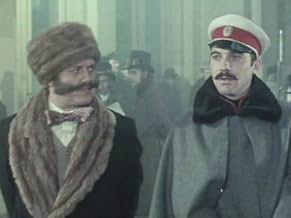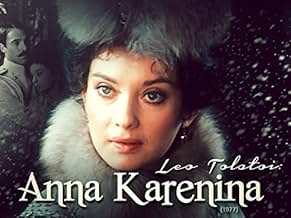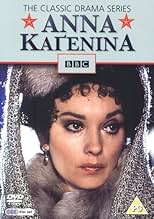Ajouter une intrigue dans votre langueAnna Karenina is the young wife of an older husband. She has an affair with the handsome Count Vronsky. By following her desires, Anna complicates her life.Anna Karenina is the young wife of an older husband. She has an affair with the handsome Count Vronsky. By following her desires, Anna complicates her life.Anna Karenina is the young wife of an older husband. She has an affair with the handsome Count Vronsky. By following her desires, Anna complicates her life.
- Nommé pour 2 Primetime Emmys
- 5 nominations au total
Parcourir les épisodes
Avis à la une
10emtj-1
I just saw the mini-series and enjoyed it so much. Yes, it was filmed in the 70s so perhaps it might be dated in its production values, but in its performances and dialogue and sheer emotional highs and lows, it is far superior to any of the other Anna Kareninas I have seen. Nicola Paget was simply smashing - you might remember her as the actress who brought Elizabeth Bellamy so vividly to life in Upstairs, Downstairs. She will simply break your heart with her portrayal of Anna. And Count Vronsky is played by the dashing Stuart Wilson, who looks every bit the part of a man a woman would give up so much for. I fell in love with this actor when he played Fernando Lopez in The Pallisers, another marvelous 70s miniseries. The trio of superb performances includes Eric Porter as Anna's rigid and emotionally devastated husband, who is hiss-worthy in many scenes, yet manages to convey the emotions boiling inside of him, giving one pause to totally hate him. Eric Porter was the marvelous Soames Forsyte in the 1967 series The Forsyte Saga, simply one of the best mini-series ever presented on television. I gave this ten stars, because when I am watching a novel by Tolstoy adapted for television, I want to see the emotions of the novel brought to life, more than I care about the settings. The entire cast is excellent, with nary a badly cast role. I had rented the series, but now have ordered it so that I can watch it again, in its entirety, whenever I please.
This version of 'Anna Karenina' by Tolstoy presents the story in ten parts of around 50 minutes each. Starring Nicola Pagett, best known as Elizabeth Bellamy in 'Upstairs, Downstairs', as Anna; with Stuart Wilson as Vronsky and Eric Porter as Karenin.
This is a leisurely version, with time to develop the minor characters and subplots, while keeping true to the book in the story of Anna's affair with Count Vronsky, and its tragic conclusion. It starts with the infidelity of her brother and in doing so, shows the difference between men and women where divorce and adultery are concerned.
As Anna, Pagett is excellent, veering from thoughtless frivolity to total despair; while Eric Porter is perfect as Karenin, strong, tormented, and complicated. Stuart Wilson is charming as Vronsky, looks the part and is an appealing character. In support the rest of the cast are excellent too, especially Sheila Gish as Betsy and Mary Morris as Countess Vronsky.
This mini series is well worth your time and doesn't have a dated feel at all - the space given to the story means this version has more weight than those with Garbo or Vivien Leigh.
This is a leisurely version, with time to develop the minor characters and subplots, while keeping true to the book in the story of Anna's affair with Count Vronsky, and its tragic conclusion. It starts with the infidelity of her brother and in doing so, shows the difference between men and women where divorce and adultery are concerned.
As Anna, Pagett is excellent, veering from thoughtless frivolity to total despair; while Eric Porter is perfect as Karenin, strong, tormented, and complicated. Stuart Wilson is charming as Vronsky, looks the part and is an appealing character. In support the rest of the cast are excellent too, especially Sheila Gish as Betsy and Mary Morris as Countess Vronsky.
This mini series is well worth your time and doesn't have a dated feel at all - the space given to the story means this version has more weight than those with Garbo or Vivien Leigh.
The limitations of a late 70's BBC budget are everywhere apparent in this nonetheless absolutely captivating production. One only wishes a proper film could have been made with this same cast and script, but of course that would have probably drained the production of what makes it so spectacular - its sheer expansiveness. In its nearly 10-hour runtime, it covers practically all of the novel's myriad episodes, and the dizzying complexities of its timeless characters - Anna's at once near schizophrenia and almost magical charm and poise, Vronsky's extreme selfishness and rakish abandon, yet unquestionable honor and devotion, and Karenin's cruel, detached vindictiveness tempered by his capacity for forgiveness and tenderness. The script is so heavily in the spirit of Tolstoy's writings that quotations from the original novel do not stick out like a sore thumb, as they do in Tom Stoppard's shockingly amateurish script for the Keira Knightley adaptation, but are rather an organic fabric of this labyrinthine and captivating piece. Perhaps hindsight drives this perception given Ms. Pagett's unfortunate mental breakdown subsequent to this production, but she is so effortlessly a living, breathing, enchanting creature suffering from truly intractable emotional and existential distress that it makes the knowledge of her end, which rather intentionally pervades the novel even without its cultural resonance, lend an intense poignance to the film. She is also every bit as beautiful as Anna should be. Supporting characters, from Oblonsky to Betsy (in particular the flippant Countess, whose true, though tested, devotion to Anna is richly filled in here) are handled spectacularly well. But the production in many ways belongs to Stuart Wilson's Vronsky, who manages to convey precisely what makes Vronsky uniquely appealing to a woman of depth - he is a melancholic, inspired, fiery, Byronic hero, and not just a preening pretty face with all of his hair (Aaron Taylor-Johnson, I sadly look at you). Those who were impatient with the Levin twin-plot in the novel will be distressed to see it nearly intact in this version, but Levin is refreshingly well-played and spirited, so that his scenes have a life to them typically denied the almost perfunctory inclusion of the character in most adaptations that do him the service of not cutting him. Kitty is also incredibly beautiful, age appropriate, and charming, so her scenes, while never quite living up to Anna's, prove a welcome distraction.
After recently reading and falling in love with the book, I started doing research into the filmed adaptations of the novel. I first watched the BBC adaptation from 2000, which impressed me, but I was somewhat disappointed by the amount of editing done to the story.
I, therefore, picked up this version with great anticipation, because it is much longer (10 hours) and I was hoping would therefore be a more fully realized version of the story.
Unfortunately, I barely made it through the first hour before turning it off and giving up on it.
The whole production felt too staged and unnatural for my taste. The actors looked like English 'thespians' dressed up in stock period costumes rather than Russian aristocrats. And they all more or less spoke in the same loud and clear stage voice making the conversations feel less intimate than I would have liked.
Camera-work and directing was mostly just like that of a noontime soap opera.
I'm sure that in 1977 this was perfectly acceptable, but nowadays, it is just not good enough to spend time watching. It certainly does no justice to what is often considered one of the greatest novels ever written.
If you are looking for a filmed adaptation of this story, stick with the more recent version from 2000. While it is a somewhat edited down version of the story, it is a much superior product that does a far better job of fully capturing the richness of Tolstoy's novel.
I, therefore, picked up this version with great anticipation, because it is much longer (10 hours) and I was hoping would therefore be a more fully realized version of the story.
Unfortunately, I barely made it through the first hour before turning it off and giving up on it.
The whole production felt too staged and unnatural for my taste. The actors looked like English 'thespians' dressed up in stock period costumes rather than Russian aristocrats. And they all more or less spoke in the same loud and clear stage voice making the conversations feel less intimate than I would have liked.
Camera-work and directing was mostly just like that of a noontime soap opera.
I'm sure that in 1977 this was perfectly acceptable, but nowadays, it is just not good enough to spend time watching. It certainly does no justice to what is often considered one of the greatest novels ever written.
If you are looking for a filmed adaptation of this story, stick with the more recent version from 2000. While it is a somewhat edited down version of the story, it is a much superior product that does a far better job of fully capturing the richness of Tolstoy's novel.
I have to admit that I saw this series only once (in 1978), and my memory of it has faded somewhat. Nevertheless, I still vividly recall its vibrant reproduction of Tolstoy's masterpiece, its authentic characterizations, and its remarkable set pieces, especially given the fact that this was a television production.
Standouts include Nicola Pagett's complicated portrayal of Anna, and Robert Swann as the ambivalent Levin. The intoxicating scene of Levin and his peasants bringing in the harvest, and Anna's tragic demise are worth viewing again.
Hope the powers that be resurrect this one in the near future!
Standouts include Nicola Pagett's complicated portrayal of Anna, and Robert Swann as the ambivalent Levin. The intoxicating scene of Levin and his peasants bringing in the harvest, and Anna's tragic demise are worth viewing again.
Hope the powers that be resurrect this one in the near future!
Le saviez-vous
- AnecdotesAnna Karenina is a novel by the Russian author Lev Tolstoy, first published in book form in 1878. Considered to be one of the greatest works of literature ever written, Tolstoy himself called it his first true novel. It was initially released in serial installments from 1875 to 1877, all but the last part appearing in the periodical The Russian Messenger. When William Faulkner was asked to list what he thought were the three greatest novels, he replied: "Anna Karenina, Anna Karenina, and Anna Karenina."
- ConnexionsFeatured in The 30th Annual Primetime Emmy Awards (1978)
Meilleurs choix
Connectez-vous pour évaluer et suivre la liste de favoris afin de recevoir des recommandations personnalisées
- How many seasons does Anna Karenina have?Alimenté par Alexa
Détails
- Date de sortie
- Pays d’origine
- Site officiel
- Langue
- Aussi connu sous le nom de
- Ana Karenina
- Lieux de tournage
- Société de production
- Voir plus de crédits d'entreprise sur IMDbPro
Contribuer à cette page
Suggérer une modification ou ajouter du contenu manquant

Lacune principale
By what name was Anna Karenina (1977) officially released in Canada in English?
Répondre






























